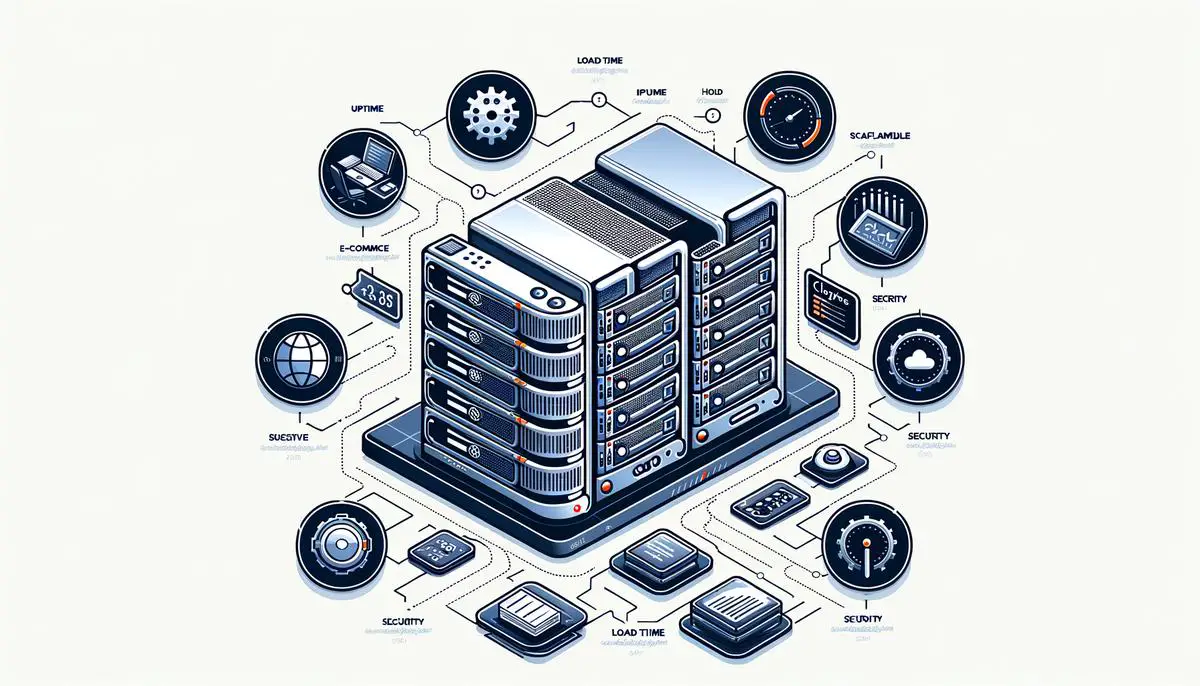Launching or upgrading your online store comes with its set of challenges, but selecting the right e-commerce hosting solution shouldn’t be one of them. For any successful online store, the choice of hosting can make or break the deal. It’s essential not only for maintaining the operational flow but also in ensuring a secure, fast, and user-friendly shopping experience. This guide dives into the critical aspects of e-commerce hosting, offering insights to help you make an informed choice that aligns with your business goals.
Understanding E-Commerce Hosting Requirements
Choosing the Right E-commerce Hosting Solution for Your Online Store
If you’re planning to launch an online store or looking to shift your existing one to a better platform, picking the right e-commerce hosting solution is crucial. It’s like setting up the best physical space for a brick-and-mortar shop. The difference? Your “location” is on the internet. Let’s jump into what you really need in an e-commerce hosting solution, so you can boost sales without hitting a snag.
- Screaming Fast Loading Speed
Picture this: a customer walks into your store but every aisle they try to go down takes forever to enter. Frustrating, right? That’s what slow loading times feel like for your online customers. A fast-loading store keeps customers happy and boosts your sales. So, ensure your hosting can handle peak traffic with lightning speed.
- Rock-Solid Security Features
Security isn’t glamorous, but it’s essential. You’re not just protecting your inventory, but also your customers’ sensitive data. Look for hosting solutions that offer SSL certificates, regular malware scans, and robust firewalls. Essentially, you want a virtual “Fort Knox” for your online store.
- Scalability to Grow With You
Your goal is to grow your business, right? Ensure your hosting can scale up effortlessly with you. Whether it’s managing an uptick in products or a surge in Black Friday traffic, your hosting should make scaling up seamless and straightforward.
- Reliable Uptime
If your store is “closed” when customers try to visit, they’ll shop elsewhere. Look for hosting options with strong uptime guarantees. Anything above 99.95% is what you’re aiming for; this means your store is always open, ready to welcome customers from around the globe.
- User-Friendly Management Tools
Unless you’re a tech wiz, you’ll want a hosting solution that makes it simple to manage your store. User-friendly control panels, easy installation processes for apps and plugins, and straightforward backend management can save you time and headaches.
- Stellar Customer Support
Even the most experienced store owners run into issues. When problems arise, having reliable customer support makes a world of difference. Look for 24/7 support through various channels like phone, email, or live chat. Having a team ready to help, day or night, can be a lifesaver.
- Specific E-commerce Features
Some hosting services go the extra mile by offering features tailored for online stores. This could be built-in payment processors, easy integrations with shipping services, or tools for email marketing. These features can enhance your store’s functionality and contribute to a smoother operation.
- Price That Matches Your Budget
Finally, consider the cost. The cheapest option isn’t always the best, but you also don’t want to overpay for features you won’t use. Find a happy medium where the price matches the value, taking into account all the features that matter to your business.
Choosing the perfect e-commerce hosting solution comes down to balancing speed, security, scalability, reliability, ease of use, support, specific features, and cost. By focusing on what you truly need, you can select a platform that not only meets your current demands but also supports your future growth. Whether you’re a burgeoning startup or a rapidly expanding enterprise, the right hosting can set the stage for your online store’s success.

Comparing Popular E-Commerce Hosting Platforms
Navigating the world of e-commerce hosting platforms can seem like a daunting task with so many options available. You want a service that not only promises performance and security but also brings extra features to the table that can truly elevate your online store. In this guide, we’ll break down how several leading e-commerce hosting platforms compare, focusing on areas that matter most to online entrepreneurs.
Seamless Integration with Payment Gateways
One critical aspect for any e-commerce business is how smoothly it can process payments. A platform that offers seamless integration with a wide array of payment gateways will ensure that your customers have a hassle-free shopping experience. This means looking beyond the basics and finding a host that supports multiple currencies and country-specific payment solutions, making it easier for global customers to shop from your store.
Marketing and SEO Tools
In the digital marketplace, visibility is key. Platforms that come packed with marketing and SEO tools give your store an edge. Features like customizable meta tags, sitemap generators, and integration with Google Analytics help in optimizing your store for search engines, while built-in email marketing tools can aid in keeping your audience engaged. Analyzing how each platform supports these functions could be a game-changer for your marketing strategy.
Mobile Responsiveness
With the increasing prevalence of mobile shopping, having a mobile-responsive site is non-negotiable. The best e-commerce hosting platforms automatically adjust your site’s layout for mobile devices, ensuring that the shopping experience is seamless, regardless of screen size. This includes touch-friendly navigation, fast-loading mobile pages, and streamlined checkout processes that cater to the on-the-go shopper.
Customizable Templates
Aesthetic appeal plays a significant role in attracting and retaining customers. Platforms that offer a wide range of customizable templates allow you to design your store in a way that stands out and aligns with your brand. Whether it’s a simple drag-and-drop editor or more advanced customization options for those with coding knowledge, the flexibility to personalize your store’s look and feel is a factor worth comparing.
App and Plugin Ecosystem
The ability to extend the functionality of your e-commerce site through apps and plugins can significantly enhance its performance and user experience. From inventory management tools to social media integration, the richness of a platform’s app ecosystem can make a substantial difference. Evaluating the quantity, quality, and cost of available apps and plugins is essential when deciding on a hosting platform.
Platform-Specific Advantages
Some hosting platforms offer unique features tailored to specific industries or business models. For example, platforms specializing in dropshipping might provide better integration with suppliers, while others may offer superior tools for subscription-based services. Identifying these platform-specific advantages will help you align your business needs with what each hosting service excels in.
By closely examining how e-commerce hosting platforms stack up in these areas, you can make a more informed decision tailored to your business model, ensuring your online store not only stays competitive but thrives. Remember, the right platform is out there; it’s just a matter of matching your needs with their offerings.

Security Considerations for E-Commerce Sites
Why Security is a Must for Your E-commerce Site and How to Make It Happen
Let’s dive straight into why ensuring top-notch security for your e-commerce site isn’t just important but absolutely crucial. In the digital world, your online store isn’t just a business—it’s also a vault that holds valuable data. From customers’ personal information to payment details, the stakes are sky-high. That’s why security isn’t just a fancy feature; it’s the backbone of trust in your digital marketplace.
First off, the big, scary word we hear too often: data breaches. Imagine this – your customer’s personal and financial information, leaked. It’s not just a nightmare for them, but a catastrophic blow to your reputation. And in the e-commerce arena, trust is everything. Once broken, it’s insanely hard to rebuild. That’s why a secure e-commerce site isn’t optional; it’s your shield against the digital world’s lurking dangers.
So, how do you fortify your online fortress? Let’s walk through some non-negotiable steps to achieve e-commerce security.
- SSL Certificate: Essentially the Foundation
- Regular Updates and Maintenance: Your Ongoing Battle
- Strong Password Policies: The Key(s) to the Kingdom
- Multi-Layer Security Measures: Like an Onion, But Stronger
- Regular Security Audits: Know Your Weak Spots
- Data Backup: Your Safety Net
Secure Sockets Layer (SSL) certification is your website’s first line of defense. It encrypts the data exchanged between your site and its visitors, making it unreadable to anyone who might intercept it. Look for the “https” and the padlock icon in the browser—signs that a site takes security seriously.
Software, like milk, has an expiration date. The difference? Outdated software opens doors to hackers. Regular updates for everything from your site’s platform to plugins are mandatory. Think of it as continually upgrading your locks in an ever-evolving security landscape.
Implement strong password requirements for both your team and your customers. Encourage (or enforce) the creation of complex passwords and regular changes. It might be a hassle, but it’s less of a hassle than dealing with a security breach.
Beyond SSL and passwords, consider additional layers of security. Firewalls to shield from external attacks, two-factor authentication (2FA) for an extra check, and back-end security measures tailored to your specific platform. The more layers, the tougher for intruders to break through.
You can’t fix what you don’t know is broken. Regular security audits help identify potential vulnerabilities in your site. This proactive approach lets you patch holes before they become gaping gateways for hackers.
In the unwelcome event something does go wrong, backups are your undo button. Ensure you have automated, secure, and regular backups of your entire e-commerce site. If a security breach occurs, a recent backup can mean the difference between a quick recovery and a slow, painful rebuild.
Setting these security practices in motion isn’t just a one-time deal. It’s an ongoing commitment to protect your business and your customers. It might seem like a lot, but compared to the potential fallout of a security breach, it’s a wise investment.
Remember, your e-commerce site’s security isn’t just a technical requirement. It’s a customer expectation, a brand promise, and a critical component of your online success. Make it a priority, and you’ll build a stronger, more trustworthy platform for your customers. Now, ready to make your e-commerce site a digital Fort Knox?

Maximizing Speed and Performance
When diving into the world of e-commerce, understanding how optimizing speed and performance can turbocharge your success is not just useful—it’s essential. Let’s get straight to the point. In today’s fast-paced digital marketplace, your online store needs to not only stand out but also deliver a seamless shopping experience. Here’s how focusing on optimizing both speed and performance can have a significant impact on your e-commerce journey.
Immediate Customer Satisfaction
Think about it; nobody likes waiting. In the digital world, this is even more pronounced. A website that loads quickly satisfies visitors immediately. This instant gratification can lead to higher engagement rates. Visitors stay longer, explore more, and ideally, make more purchases. If your e-commerce site can provide that lightning-fast experience, you’re already a step closer to winning over your audience.
Increased Conversion Rates
Speed directly influences conversion rates. Studies have shown that even a one-second delay in page response can result in a 7% reduction in conversions. If your e-commerce site is swift, you’re more likely to convert casual browsers into paying customers. Optimizing your site’s speed can be the difference between a booming business and a struggling startup.
Improved Search Engine Ranking
Search engines like Google prioritize user experience, and site speed is a critical factor in that equation. Faster websites rank higher in search results, leading to increased visibility for your business. This means more traffic to your site and, consequently, more opportunities for conversions and sales. By optimizing your e-commerce site’s speed, you’re not just improving user experience; you’re also boosting your SEO efforts.
Reducing Bounce Rates
A bounce happens when a visitor leaves your site after viewing only one page, and a high bounce rate is a clear indicator that your site is not performing as well as it could be. Slow-loading pages are a common culprit for high bounce rates. By speeding up your site, you make your website more engaging and reduce the likelihood of potential customers bouncing away to a competitor’s faster site.
Enhancing Mobile Experience
With more and more people shopping on their mobile devices, having a mobile-responsive site is no longer optional. Mobile users expect quick, easy-to-navigate shopping experiences on their smartphones and tablets. If your e-commerce site is optimized for speed and performance on mobile devices, you’re tapping into a vast market of mobile shoppers ready to buy.
Streamlining Operations
A fast, efficient website isn’t just beneficial for your customers—it can make your life easier, too. E-commerce platforms with user-friendly management tools that are optimized for performance can simplify inventory management, order processing, and customer service. This leaves you more time to focus on growing your business instead of troubleshooting website issues.
Building Trust and Credibility
A professional, fast-loading e-commerce site sends a message that you’re a credible and trustworthy business. First impressions matter, and a sleek, speedy site can help make sure potential customers’ first encounter with your business is a positive one. This initial trust can be the foundation of a long-lasting customer relationship.
Summing Up The Speedway
Optimizing the speed and performance of your e-commerce site is not just about making your site faster—it’s about creating a better shopping experience, improving your marketing effectiveness, and ultimately, boosting your bottom line. Speed and performance optimization should be an ongoing part of your e-commerce strategy, not a one-time fix. By committing to continuously monitoring and improving your site, you’re investing in the long-term success of your e-commerce venture. Remember, in the digital race for success, speed, and performance can give you the edge you need to outpace the competition.

Scaling Your E-Commerce Site
Growing your e-commerce venture is an exhilarating phase, but it brings along its fair share of hurdles, particularly when it comes to scaling your hosting effectively. Given today’s competitive digital marketplace, ensuring that your e-commerce site can handle an influx of visitors while maintaining optimum performance is a puzzle many entrepreneurs strive to solve.
Diving into the realm of e-commerce scaling, one critical aspect that cannot be overlooked is the adaptability of your hosting solution. As your online store evolves, transitioning from shared hosting to more robust options like VPS (Virtual Private Server) or dedicated hosting becomes paramount. This transition ensures your website can accommodate increased traffic without experiencing downtimes or lag.
Another focal point is investing in a Content Delivery Network (CDN). A CDN not only accelerates the loading time of your e-commerce site globally but also helps manage sudden spikes in traffic. Essentially, it ensures your site’s data is replicated across various locations worldwide, making it faster and more reliable for users across the globe.
Equally important is the emphasis on analytics and monitoring tools. As you scale, understanding your site’s performance in real-time becomes invaluable. Leveraging tools that offer insights into your website’s traffic patterns, peak usage times, and potential bottlenecks can guide you in optimizing resources effectively. For instance, knowing when to scale up or down based on traffic forecasts can prevent over-expenditure on hosting resources.
Furthermore, tailoring your hosting plan to accommodate high-quality images and videos without compromising on speed is another puzzle piece in the scaling journey. High-resolution media files are pivotal in showcasing your products effectively but can significantly slow down your site. Opt for hosting solutions that offer ample storage and bandwidth while leveraging image optimization tools to ensure that your rich media does not become a bottleneck.
Lastly, fostering a collaborative relationship with your hosting provider is essential. As your e-commerce business grows, having a provider that understands your business goals and is ready to offer support and advice when scaling is invaluable. Ensure that your provider is not just a service but a partner in your growth journey, willing to provide bespoke solutions tailored to your specific needs.
In essence, scaling your e-commerce hosting effectively revolves around anticipating growth, being proactive in employing scalable solutions, and maintaining an open channel with your hosting provider. By adhering to these principles, you’re not just preparing your online store for growth but also ensuring that your infrastructure is robust enough to support your business’s evolving needs seamlessly.

Choosing the optimal e-commerce hosting solution is a critical decision that can significantly impact your online store’s success. It involves more than just comparing prices; it’s about finding a hosting service that aligns perfectly with your business needs — whether it’s handling high traffic volumes gracefully, securing customer data, or scaling with your growing business. By emphasizing speed, security, scalability, and support, you’re not just investing in a hosting service; you’re laying a robust foundation for your e-commerce platform to thrive in the competitive digital marketplace.
